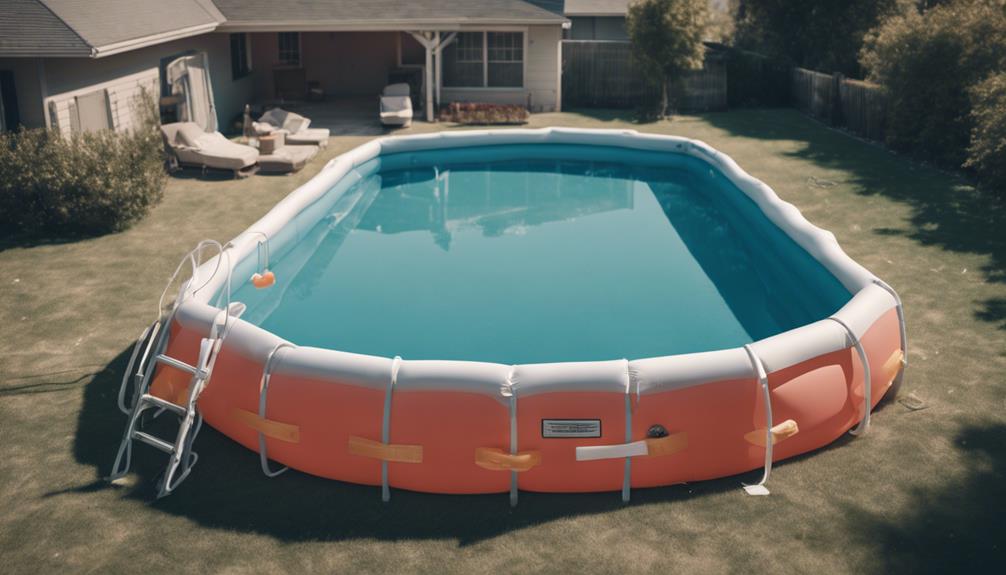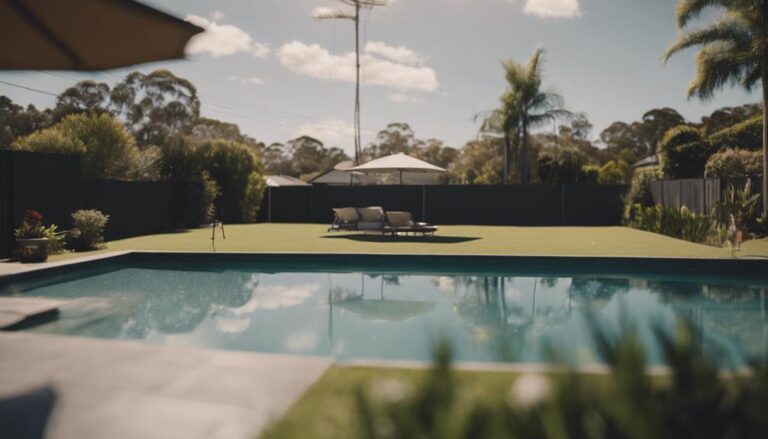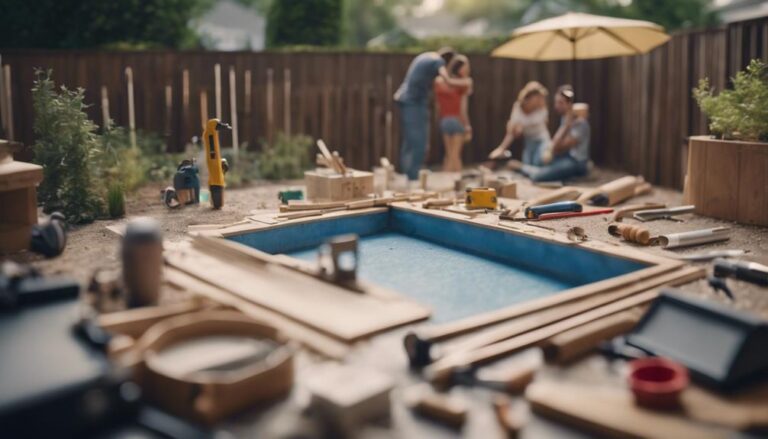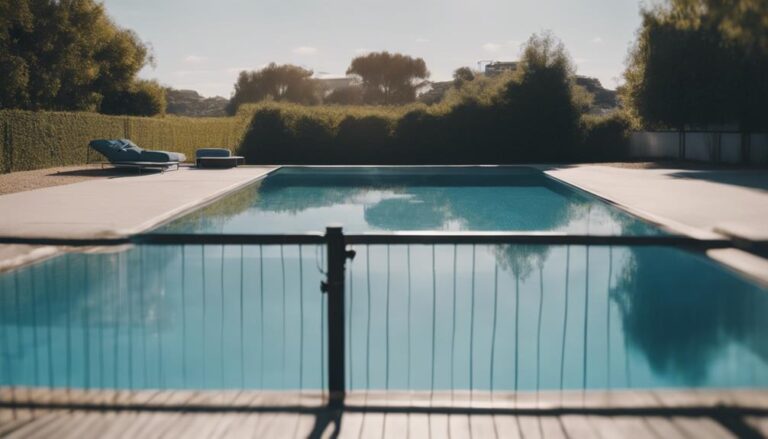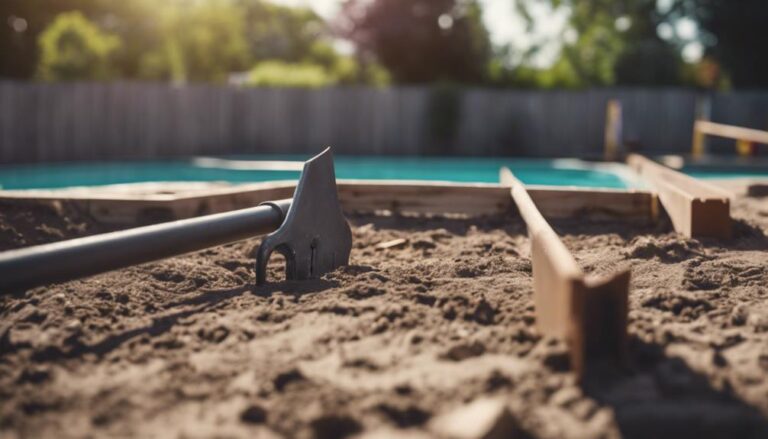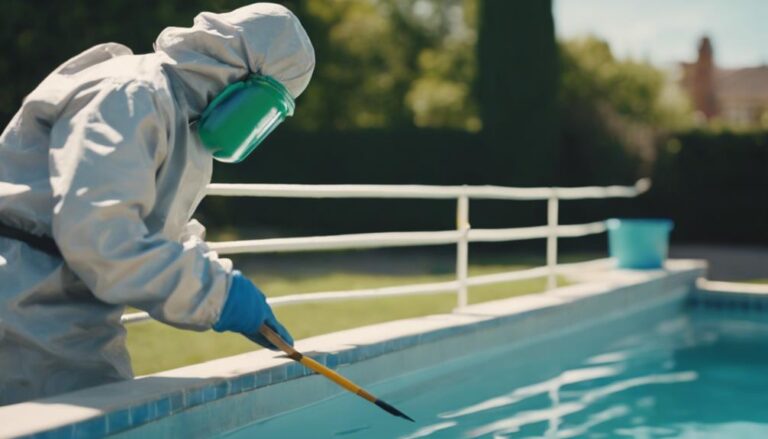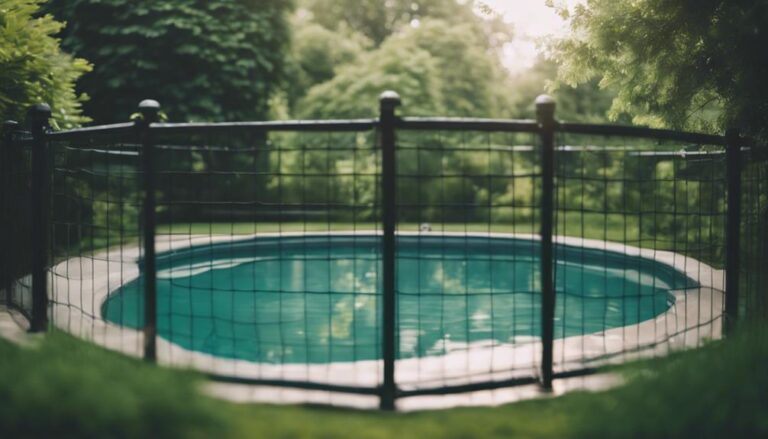What Size Pool Needs a Fence
If your pool is deeper than 300mm, whether it is in-ground or above-ground, it necessitates a fence. This requirement is not merely for aesthetic purposes but serves as a crucial safety precaution.
According to state regulations, your fence must have a minimum height of 1200mm to prevent accidents and deter unsupervised access. This measure is vital for the protection of your loved ones.
It's essential to highlight that inflatable pools are also subject to these rules. If they exceed 18 inches in depth, they must be surrounded by a barrier at least 4 feet high.
Compliance with these regulations is a demonstration of responsibility and a commitment to safety. Follow these guidelines to ensure you meet all necessary safety standards.
Understanding Pool Fence Laws
Did you know that pools deeper than 300mm, including above-ground and inflatable ones, must have a barrier installed as per pool fence regulations to safeguard everyone's safety? These regulations aim to avert accidents, especially among children, by establishing a secure perimeter around water bodies. Observing these rules isn't merely about compliance but also about protecting the lives of your loved ones.
In Queensland, for instance, the Queensland Development Code MP3.4 Swimming Pool Barrier specifies particular requirements for pool fences to ensure pool safety. It's vital to recognise that regulations can differ by state, so consulting your local government is necessary to understand the precise fencing requirements in your area.
Prior to constructing or installing a pool, consulting a QLD pool fence regulations checklist can prove invaluable. This checklist can assist you in ensuring your pool barrier adheres to the depth requirements and regulations, ultimately aiding you in avoiding substantial penalties for non-compliance. A well-considered fence isn't just a legal obligation; it's an essential step in preventing tragic incidents and guaranteeing the safety of children around pools.
Requirements for an Above Ground Pool
If you own an above-ground pool that's over 300mm deep, you'll need to comply with specific height regulations and enclosure specifications to ensure safety.
It's crucial you check your state's laws, as they determine the necessary barriers and deck regulations for your pool.
Height Regulations
For above-ground pools with a depth exceeding 300mm, it is necessary to have a pool fence that measures no less than 1200mm in height to ensure safety and adherence to regulations. It is paramount to keep your family and guests safe around bodies of water, with the height regulations for pool fences playing a crucial role in this endeavour.
- A barrier of 1.2 metres is required for inflatable pools deeper than 45cm, minimising the risk of accidents.
- Deck regulations must be consistent with state legislation, aiming for a cohesive safety strategy.
- Height regulations for above-ground pools are established to deter unsupervised access, especially by children.
- Adhering to these regulations not only improves safety but also ensures legal compliance, safeguarding you against potential legal issues.
Enclosure Specifications
Having discussed height regulations, attention must now turn to enclosure specifications for above-ground pools, where adherence to safety and legal standards is paramount.
Pool barriers are necessary for any above-ground pool deeper than 300mm to maintain everyone's safety. For inflatable pools exceeding 18 inches in depth, a barrier of at least 4 feet is required to mitigate accidents and potential drownings.
It's also advised to review deck regulations surrounding your pool to ensure they meet state laws. Fencing laws apply universally to all pools, inclusive of above-ground and inflatable varieties, underscoring the significance of averting drownings and safeguarding the safety of individuals in the vicinity of the pool.
Inflatable Pool Regulations
You must be aware of your local bylaws concerning inflatable pool regulations to ensure you are compliant and maintaining a safe environment.
These regulations include necessary safety measures such as installing a 4-foot barrier around pools deeper than 18 inches.
Moreover, becoming familiar with the guidelines for installing and removing these pools will help prevent accidents and ensure your summer fun remains secure.
Overview of Local Bylaws
For inflatable pools deeper than 45 centimetres, a barrier at least 1.2 metres high is mandatory for safety; however, it's imperative to review local ordinances as they may stipulate additional fencing requirements. Familiarising oneself with these local ordinances and regulations is key to remaining compliant and promoting safety, deterring unauthorised access and potential accidents.
Key considerations include:
- Local ordinances may define varying heights for pool barriers.
- Certain regions mandate fencing for pools of all depths to mitigate accident risks.
- The aim of regulations is to guard against unauthorised entry to inflatable pools.
- Adhering to local regulations is crucial for the safety of inflatable pools.
It is recommended to consult local authorities to ascertain the requisite fencing for your inflatable pool, ensuring adherence to all safety and regulatory standards.
Safety Measures Required
To ensure the safety of inflatable pools with a depth exceeding 18 inches, it is necessary to erect a barrier of at least 4 feet in height, in adherence to safety standards. This goes beyond mere legal compliance and serves as a preventive measure against potential accidents, especially those involving young children.
Despite the temporary nature of inflatable pools, the need for safety remains of utmost importance. Recognising when a pool requires a barrier is crucial.
By equipping your inflatable pool with a barrier that meets regulatory standards, you are taking a fundamental step towards enhancing the safety of the pool area and deterring unauthorised entry. This proactive measure significantly reduces the risk of drowning incidents, creating a more secure environment for all pool users.
Adhering to these regulations demonstrates a commitment to safety and responsibility.
Installation and Removal Guidelines
Installing a perimeter around your inflatable swimming pool, which must be a minimum of 4 feet in height, isn't just about following guidelines; it plays a crucial role in preventing accidents. As the owner of a pool, you have the responsibility for the safety of children and all individuals near your pool.
Here are important points to consider:
- Your perimeter must be strong and secure to prevent any accidents.
- To ensure proper installation, sturdy posts are needed to meet stability requirements.
- Regular maintenance is essential to keep the perimeter in compliance with regulations.
- Following regulations not only reduces the risk of injuries but also upholds safety standards.
Compulsory Fence Heights
Ensuring your pool fence has a minimum height of 1200mm is essential for adhering to safety regulations and preventing accidents. If you are installing a new pool or evaluating the safety of an existing one, it is imperative to recognise that the minimum height requirement for pool fences is not merely a guideline—it is a mandatory standard. This criterion is applicable to pools of all sizes, including above-ground pools, particularly those exceeding 300mm in depth, to hinder unsupervised access and accidental drownings. Compliance with this height is a crucial aspect of meeting pool safety standards.
Here is a concise guide to understanding the required fence heights:
| Pool Type | Minimum Fence Height | Purpose |
|---|---|---|
| All Pools | 1200mm | To hinder unsupervised access and accidental drownings |
| Above-Ground Pools | 1200mm | Especially significant for pools over 300mm deep |
| Pool Sizes | 1200mm | Mandatory for safety, irrespective of the pool's dimension |
Adherence to these regulations ensures that your pool area is not only compliant but also secure for everyone, greatly reducing the risk of tragic incidents. Always prioritise safety in pool design and use.
Distance and Placement Guidelines
In addition to meeting the minimum height requirement, you must also pay attention to the specific distance and placement of your pool fence to ensure complete compliance with safety regulations. The height of the fence isn't the sole consideration; ensuring the correct gap distance and meticulously following pool fencing regulations can greatly reduce the risk of accidents near the pool.
Here are some essential guidelines to remember:
- Fence Height: Your pool fence should be at least 1200mm in height to conform to safety standards. This height is critical for deterring access by young children.
- Gap Distance: The distance from the ground to the bottom of the fence should be less than 100mm to stop young children and animals from crawling underneath.
- Consult Local Government: Pool fencing regulations can differ markedly across states or regions, making it vital to consult your local government for the specific pool fence requirements applicable to your area.
- Compliance is Fundamental: Compliance with these regulations isn't merely about avoiding penalties; it's about safeguarding everyone in the vicinity of the pool. Adhering to pool safety standards can significantly reduce the possibility of accidents.
This guidance is designed to aid in ensuring that your pool area is both safe and compliant with the relevant safety regulations.
Council Approval Process
After familiarising yourself with the guidelines regarding distance and placement for your pool fence, you will need to obtain council approval for any pool deeper than 300mm to adhere to safety and legal requirements. This approval isn't merely procedural; it ensures your pool fencing meets necessary safety standards to prevent accidents.
The process involves submitting a design of your pool fence, detailing the height, materials, gate features, and the non-climbable zones surrounding your pool. This stage is where the council evaluates whether your design conforms to strict safety regulations.
| Requirement | Significance |
|---|---|
| Fence Height | Prevents children from climbing over |
| Materials Used | Assesses durability against weather and impact |
| Gate Specifications | Guarantees self-closing and latching mechanisms |
| Non-Climbable Zones | Hinders children from accessing the pool area |
Adhering to these requirements is fundamental in ensuring the safety of the pool area, safeguarding against potential accidents. The council's approval process is designed to verify compliance with these safety measures, reflecting a commitment to maintaining high safety standards in residential pool installations.
Pool Barrier Ownership Duties
As a property owner or tenant, you have a significant responsibility to ensure that your pool barrier complies with local safety regulations, regardless of the pool's size. This duty is crucial for preventing accidents and meeting legal standards.
Your responsibilities include:
- Checking that the pool barrier adheres to local safety regulations.
- Regularly inspecting the barrier for any damage or weaknesses that could affect its safety.
- Making sure the pool gate is always securely closed, with no objects nearby that could allow unauthorised access, particularly by children.
- Carrying out regular maintenance to fix any wear and tear, to keep the pool barrier in top condition.
Both property owners and tenants are accountable for maintaining a safe and secure environment around the pool area. By staying alert and taking proactive measures in your maintenance efforts, you help to promote community safety and show your dedication to upholding the highest standards of pool safety.
Choosing a Secure Pool Barrier
When choosing a secure pool fence, it's crucial to make sure it meets specific safety standards and state laws, such as the Queensland Development Code MP3.4. This is vital to protect your family and comply with legal obligations. It's a requirement that any pool deeper than 300mm, including above-ground and inflatable pools, must have a fence around it to improve safety and prevent accidents.
For inflatable pools with a depth exceeding 18 inches, a barrier of at least 4 feet is necessary. This is not just a recommendation but a legal obligation for your safety and that of others. Adhering to state regulations is essential when it comes to pool safety.
Properly installing your pool fence is extremely important. This includes securing the fence with 16-18 inches of concrete and ensuring that the posts are stable and firmly planted in the ground. These measures guarantee that the fence will remain sturdy and effective when required.
Ornamental iron fences are considered the most secure choice available. These fences not only meet compliance standards but also enhance the visual appeal of your pool area. By selecting ornamental iron, you are opting for a fence that is resistant to climbing attempts, thus significantly reducing the risk of accidents. Safety around the pool area should always be a priority in your decision-making process.
Frequently Asked Questions
How large does a pool need to be in order to require a fence?
You're asking about pool size for fencing requirements. In Queensland, any pool deeper than 300mm, including above-ground and inflatable pools over 18 inches, must have a fence. It's about safety, not just size, so check your local laws.
What is the code for pool fence in Australia?
In Australia, you are required to install a pool fence that meets specific safety codes. These regulations include the height of the fence, the materials used, gate requirements, and secure zones to prevent unsupervised access, particularly by children.
Is it illegal to not have a fence around a pool in Australia?
Yes, in Australia it is illegal not to have a fence around your pool if it holds more than 300mm of water. This regulation applies to all pools to ensure the safety of children and prevent unauthorised access.
Do Above Ground Pools Need a Fence in Queensland?
Yes, in Queensland, if you're installing an above-ground pool deeper than 300mm, you'll need a fence. It's crucial for safety and legal compliance, ensuring protection against accidents, especially for children. Always check local regulations.
